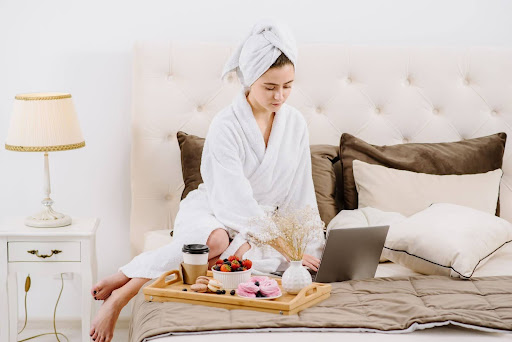Guide to a Healthy Morning Hygiene Routine
From brushing your teeth to effective hand hygiene, every small habit plays an important role in keeping germs and bacteria at bay, preventing body odor, and boosting your overall well-being.
But are you following the right hygiene steps? A well-structured routine isn’t just about looking good— it’s about feeling your best from the inside out.
Whether you want to improve oral care, skin care, or body hygiene, incorporating the right practices can set the tone for the rest of the day.
Let’s explore the essential steps of a morning hygiene routine, which will keep you feeling refreshed and ready to take on the day!
1. Proper oral care
A fresh and healthy morning routine starts with brushing your teeth for at least two minutes using a soft-bristled toothbrush and fluoride toothpaste to eliminate bacteria and plaque buildup, preventing cavities and gum disease. Be sure to brush your molars, outer tooth surfaces, and inner tooth surfaces.
Don’t forget to clean your tongue to prevent bad breath and bacteria accumulation. Use your toothbrush bristles or a tongue scraper. Some toothbrushes have a tongue scraper on the back.
Lastly, floss your teeth to remove any food particles that may be stuck between them. Then, rinse your mouth with an alcohol-free mouthwash for extra freshness and gum protection.
2. Wash your face
Cleansing your face in the morning serves an important purpose: it washes away oil, bacteria, sweat, and dirt that can settle on your face overnight and prevents acne, breakouts, and various types of skin infections.
Use a gentle cleanser, preferably an antibacterial soap or body wash that has been dermatologically tested, is enriched with moisturizers, and offers 99.9% germ protection. Rinse with lukewarm water to avoid dryness or irritation.
3. Shower the right way
Take a warm, steamy shower. It not only refreshes your body and removes sweat, but it also increases blood flow, improves immune functions, and eases muscle aches and pains.
Use lukewarm water to avoid stripping your skin of natural oils. For your shower, choose a hydrating, pH-balanced, antibacterial body wash.
Focus on cleansing key areas like the underarms, feet, and intimate zones, such as the genitals. Rinse thoroughly to avoid leaving residue on the skin.
Additionally, avoid over-exfoliating; two to three times a week is enough to remove dead skin cells. Learn more about the crucial showering or bathing steps and mistakes to avoid.
After showering, apply a lightweight moisturizer suited to your skin type to keep it soft, hydrated, and free from dryness or irritation.
4. Apply deodorant or antiperspirant
Sweating is a natural process, but when it comes in contact with bacteria on the skin, it can cause an unpleasant odor. Deodorant helps mask and neutralize odor, while antiperspirant reduces sweat production.
Apply deodorant or antiperspirant after you shower. To maximize absorption, apply deodorant to clean, dry skin. This will help you stay fresh, feel confident, and smell good throughout the day.
5. Nail and hand hygiene
Trim your nails weekly to avoid dirt accumulation, and gently clean under them to prevent infections. Use a moisturizing hand cream to keep your hands soft and prevent dryness.
Practicing proper hand, such as knowing the steps for the most effective hand washing experience and nail hygiene, ensures better health, cleanliness, and a polished appearance.
6. Dress in fresh, clean clothes
Wear fresh, clean clothes and undergarments daily to prevent bacteria buildup and body odor. This is vital for personal hygiene and confidence, as it helps you leave good first impressions in social or professional situations. Also, remember to wear fresh socks and clean shoes to avoid foot odor.
FAQs
Why is it important to hydrate first thing in the morning?
Drinking water in the morning helps your body recover from nightly dehydration, flushes out toxins, helps kickstart your metabolism, and supports various bodily functions.
Should I brush my teeth before or after breakfast?
Brushing your teeth before breakfast is best to remove overnight bacteria. If you have to brush your teeth after breakfast, try to wait at least 30 minutes before you brush.
How does a morning hygiene routine improve confidence?
Incorporating self-care and hygiene practices into the morning routine demonstrates self-love and self-respect. These actions nurture physical well-being and establish a foundation for confidence and resilience.
